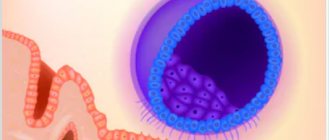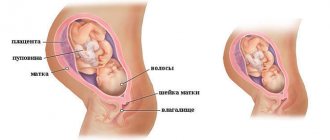07.07.2020 18238 0
To determine the gestational age, doctors usually use the obstetric calculation method. The countdown starts from the first day of the last menstruation. The embryonic period is calculated from the actual moment of conception and lags behind the obstetric period by about 14 days. The third week of pregnancy from conception corresponds to the fifth week of the obstetric period. During the first two weeks, a woman’s body prepares for conception, and if the egg has been fertilized, then the beginning of the third week is the actual conception. At this time, the fertilized egg (zygote) begins to actively divide, moving along the fallopian tubes into the uterine cavity and attaches to its wall. By the end of the third week, the development of the embryo in the womb begins.
What happens to the fetus?
We have already found out that fertilization of the egg occurs at this time. Moving along the fallopian tube, the mature egg moves to the uterus, leaving the ovary. Sperm penetrate from the uterus into the fallopian tubes, one of them reaches the egg. From the moment the sperm and egg merge, the development of the baby begins.
Its genetic set is the genes of the egg and sperm. The baby's gender, skin, eye and hair color, and other congenital characteristics have already been determined. In 9 months, a unique person will be born, similar to both dad and mom.
Feelings in the third week of pregnancy
First of all, at this time there is a change in the psycho-emotional state of the woman. This manifests itself in different ways. Some women become very calm, they are satisfied with everything, and a feeling of stability and satisfaction appears. For others, on the contrary, everything falls out of hand, they are irritated, feel constant anxiety, and experience causeless anxiety.
In both cases, the changes are caused by sudden hormonal changes in the body, which is being rebuilt from its normal state to the state of pregnancy.
Emotional changes can be accompanied by physical changes. Due to fluid retention in the body, edema may occur. Also during pregnancy, a decrease or increase in appetite is often noted.
What happens in a woman's body?
A cell containing a complete double set of chromosomes is called a zygote. Within 24 hours it begins to divide rapidly. One cell turns into 32 in three days, and by the end of the week this number reaches 250 cells. Now your fruit is called a morula and its size is often compared to a grain of sand, and its shape to a mulberry.
Prenetics is a way to find out the risk of chromosomal abnormalities
already from the 10th obstetric week. Recommended for every pregnant woman. Duration of two days!
More details
What examinations should be done at 3 weeks
To detect pregnancy early, you need to regularly measure your basal temperature. In the third week, its readings should not be lower than 37 degrees.
If a woman believes that pregnancy has occurred, she must take a blood test for hCG, which can not only accurately determine the presence of pregnancy, but also determine its location.
It is also recommended to do a progesterone test, the results of which will show how the pregnancy is developing and, if necessary, help take measures to maintain and preserve the pregnancy.
There is no need to take a urine test for hCG in the third week. The content of the hormone in the urine is still extremely low, so the result will certainly be negative.
Pregnancy tests are used to determine pregnancy at home. However, in the third week the test may not show anything, since the urine still contains too little hCG.
Ultrasound at 3 weeks of pregnancy. At the beginning of this week, the zygote is still too small to be seen during testing. But by the end of the third, beginning of the fourth week of pregnancy, you can see the place of attachment of the embryo to the uterus.
During an ultrasound, the size of the corpus luteum is determined, which is an important diagnostic indicator. If the size is large, this indicates the presence of a cyst in the corpus luteum, which, as a rule, resolves on its own in the second half of pregnancy or after childbirth. It is much more dangerous when the size of the corpus luteum is too small. In this case, there is a high risk that progesterone will not be synthesized in the required quantities, which can lead to miscarriage.
What other changes occur in the body of the expectant mother?
As before, the characteristic symptoms of pregnancy in the third obstetric week are invisible, or even completely absent. A woman may not notice any specific sensations during this period. However, the expectant mother’s body is ready to receive a fertilized egg, so there is a possibility that, as two weeks earlier, barely perceptible painful sensations in the lower abdomen and lower back will appear, as well as increased libido.
Already known changes in the mammary glands, their engorgement and increased sensitivity may continue.
It is possible that taste preferences will change towards salty or sweet.
The nature of vaginal discharge changes. Mucus helps protect the egg from external infections.
Ultrasound
You can also undergo an ultrasound at 3 weeks of pregnancy if you have any suspicions. At this stage, the study is carried out with a transvaginal sensor. An ultrasound at 3 weeks of pregnancy can show (although not necessarily) where the embryo has settled (that is, the resulting pregnancy develops in the uterus or ectopically), and can also assess the condition of the muscle tissue of the uterus, which is of great importance in prognostic terms.
But in practice, the 3rd week of pregnancy for most women passes in the most ordinary way, like “pre-pregnancy” life: they are waiting for the onset of their next period and have not yet thought about hCG and ultrasound.
What should an expectant mother not do at this time?
- Rid yourself of negative emotions and physical activity, spend more time in the fresh air, get proper rest and get enough sleep.
- Do not lift weights, refuse dangerous and tiring sports. Now more than ever you need peace and good mood.
- Completely give up alcohol and cigarettes, even eliminate passive smoking.
- Do not visit places where there is a risk of contracting an infection.
- Avoid X-ray examinations that are risky for the baby, as well as uncontrolled use of medications.
Pregnancy at 2-3 weeks, what happens
At the end of the first and throughout the second week after conception, the fertilized egg is immersed in the wall of the uterus. At the same time, the formation of the chorion, a branched membrane, begins. With its help, the embryo attaches to the wall of the uterus. The placenta will eventually develop from the chorion, through which the baby will receive the necessary nutrients, including oxygen. Until the end of the second week, the laying of fetal organs has not yet begun.
The fertilized egg at this moment is very vulnerable, and any negative factors can destroy it. If at this moment you become poisoned with alcohol or get sick, the egg will die. But if the egg survived, it means that the negative factors turned out to be insignificant in strength. They also did not affect the child’s development in any way, since he had not yet begun to form. Thus, if the pregnancy continues to develop successfully, there is no need to worry about harm to the unborn baby at this stage.
Starting from the third week, the process of embryo development begins. In the period from 3 to 13 weeks, the formation of all human organs and systems occurs.
It is called the period of organogenesis. Any harmful factors at this moment can cause serious harm to the fetus, cause failure in the formation of one or another organ and lead to pathology of fetal development.
Which specific organ will be damaged depends on the duration of pregnancy and the harmful factor affecting it.
Early pregnancy symptoms - third week
Due to the fact that the period of 3 weeks of pregnancy, which we consider in the material n7e, always shows a delay in menstruation, many find out about the very fact of pregnancy much later, reassuring themselves and attributing the delay to inflammation and other problems. The most important symptom that can warn of pregnancy in advance is pain similar to menstrual pain, which manifests itself in the process of attachment of the zygote to the inner wall of the uterus. The pain is noticeably weaker than menstrual pain, but still reminiscent of it, pulling and pushing of a spasmodic nature, which does not cause inconvenience, but at the same time makes itself felt. In addition, a number of signs have been identified that directly or indirectly indicate pregnancy:
- Nausea is an optional manifestation, but given the absence of it previously, we can conclude that a new life appears in the body - pregnancy;
- A change in culinary preferences is the most common manifestation, but the woman is not aware of this;
- Odor intolerance is the most striking manifestation of pregnancy in the third week. Especially concerns the smells of fish, fresh meat and the like;
- Fatigue, weakness, weakness - the reason for this is the changed priority in blood circulation. With the appearance of the embryo, blood circulation is transferred to the pelvic organs, accordingly, part of the blood flows from the brain;
- Frequent urination - many women in the third week of pregnancy confuse this symptom with cystitis or a female cold. In fact, this is due to a change in blood circulation and renewal of kidney function;
- Engorgement of the breast nipples and their soreness - for many, this is a sign of the onset of menstruation and these symptoms remain unattended. If a woman knows her cycle well enough, these will be the first calls for her to make an appointment with a gynecologist;
- Implantation bleeding is a symptom of pregnancy in the third week, which many women mistake for their period starting a little earlier than expected. In fact, this is all unnecessary from the process of planting the zygote in the uterus; during implantation, it literally chews out the epithelium, freeing blood vessels to join them. Such spotting during the 3rd week of pregnancy deceives women, especially those who do not want a baby. It is because of this symptom of pregnancy that there is an opinion that menstruation can pass through the fetus for some time.
The last statement is impossible, since menstruation is a consequence of the destruction of an unfertilized egg and the removal of products of preparation for conception. Since the third week of pregnancy is underway, the hormonal balance has already adjusted to maintaining the embryo, and not to producing new eggs. Since they do not mature, ovulation and subsequent destruction of the unfertilized egg and menstruation do not occur. The shade of implantation discharge can vary from pinkish to brown. The implantation period is approximately 40 hours, so in two days all the bruising should stop and this also serves as a signal that it is time to make an appointment with an obstetrician because the third week of pregnancy is over.
Visible changes on ultrasound
Ultrasound examination at the 3rd week of the embryonic period is carried out using a transvaginal sensor.
This method is more informative; it allows you to record the following changes:
- Confirmation of intrauterine pregnancy – detects the site of embryo implantation;
- Exclusion of ectopic pregnancy;
- Exclusion of hydatidiform mole, a disease in which the number of bubbles grows in the uterus instead of an embryo;
- Thickening of the endometrium, or its hyperplasia;
- The embryo is in the form of a tiny white dot in the cavity of the fertilized egg;
- High vascularization (increased blood supply) of the corpus luteum, sometimes defined as an ovarian cyst.
There is no significant enlargement or change in the structure of the uterus. The third week of pregnancy according to the obstetric period does not make it possible to detect any significant changes on ultrasound. If there are problems with conception, an ultrasound is performed at the 3rd obstetric week to determine whether ovulation has occurred or not.
Sexual relations
The third week according to the obstetric method is the time of fertilization of the egg, so sex is given special importance. Having sexual intercourse 2-3 days after probable ovulation increases the likelihood of conception and improves sperm quality. Both a decrease in sexual desire and its increase are variants of the norm.
During sex in the 3rd week of pregnancy, calculated using the embryonic method, a rare sign of pregnancy may appear - severe pain in the vagina and external genitalia. These sensations are short-lived and disappear quickly.
If bloody vaginal discharge, pain, or a threat of miscarriage appear, intimate relationships will have to be temporarily stopped. A complete contraindication to sexual contact is an STD in a partner or bacterial infections in him.
Is it possible to have periods during pregnancy?
06.11.2020
during pregnancy . If you experience bleeding or even spotting during pregnancy, this may be a sign that something is wrong. In any case, bleeding is an indication for medical consultation . In such cases, a quick reaction is important, often determining the further course of pregnancy .
Bloody discharge in early pregnancy is often confused with menstruation . This is because spotting usually occurs around the expected period. In addition, the bleeding may be as heavy as during a normal period. However, it should be remembered that menstruation during pregnancy and can only be a threatening symptom of pregnancy . Therefore, it is always better to consult a pregnancy and childbirth doctor .
Menstruation during pregnancy
Menstruation is the result of the shedding of the uterine under the influence of estrogen and progesterone. This epithelium is removed from a woman's body during what is called her period. After fertilization, the epithelium does not peel off because it is necessary for the development of the child and during pregnancy . Therefore, the appearance of menstruation during pregnancy is impossible.
Bloody discharge early in pregnancy
Before a woman knows she is pregnant , she may experience implantation spotting, which she may mistake for pregnancy . However, this spotting is caused by the implantation of the embryo into the uterine , which sometimes leads to damage to the blood vessels . However, the blood during implantation is lighter and the woman does not feel pain. Despite this, many women later believe that she had her period in the first few months of pregnancy .
Bloody discharge during pregnancy is also a result of hormonal changes caused by the developing pregnancy . Bloody discharge in early pregnancy may be a consequence of subchorionic bleeding. This is associated with the formation of hematomas. They are usually absorbed by the 20th week of pregnancy . However, it happens that they lead to serious complications and even miscarriages.
Pregnancy period - other reasons
There are many reasons for bleeding during pregnancy . This includes:
- molar (gestational trophoblastic disease) - occurs at approximately 5-6 months of pregnancy . Initially, it is practically invisible during ultrasound examinations, and its appearance is indicated only by a high level of hCG in blood tests . Today, the disease no longer poses such a threat to either mother or child;
- diseases of the cervix , for example, erosion;
- ectopic pregnancy - bleeding is accompanied by vomiting, abdominal pain , weakness and nausea . In this case, it is not possible to save the child’s life, and in addition, such a pregnancy also poses a threat to the woman’s health;
- a miscarriage is when bleeding occurs, and in addition, severe pain occurs in the abdomen , spine and contractions of the uterus , etc.
In any case, even during pregnancy a doctor immediately . Even if the amount of blood is insignificant. If the disease develops, it should be diagnosed as soon as possible. This is very important for the health of the mother and developing baby.
Published in Pregnancy and pregnancy management Premium Clinic
How to determine pregnancy
Whether a woman is unwell or not, in the third week of pregnancy a delay in menstruation is already obvious. Therefore, at this stage, many people run to the pharmacy for tests to determine pregnancy. Research using a test at this moment usually gives the correct result. There is already enough hormone in the urine for modern tests to detect it. The main thing is that during the procedure the woman correctly fulfills all the requirements of the instructions that are attached to the test.
A positive test result gives grounds to visit a doctor. The doctor will examine the pregnant woman, determine the approximate duration of pregnancy and calculate the approximate date of birth.
Woman's sensations and visual signs
At this stage of pregnancy, significant hormonal changes in the woman’s body and metabolic changes occur. These changes determine the sensations experienced by the pregnant woman and changes in her appearance.
Signs of pregnancy at 3 weeks:
- Lack of menstruation;
- Changes in attitude towards various dishes, products, aversion to previously familiar and loved ones, and the desire to eat something exotic;
- Fatigue, drowsiness, mild depression - symptoms are caused by increased production of progesterone;
- Soreness, increased sensitivity and symmetrical engorgement of the mammary glands;
- Mood swings, alternating tearfulness and irritability with a feeling of euphoria;
- Heightened perception of smells, aversion to the aromas of perfumes, meat broth, etc.;
- Increased or lack of appetite;
- Frequent urination;
- The appearance of constipation;
- The appearance of mild pain in the lower back or lower abdomen;
- Nausea, weakness;
- Increase in basal temperature values up to +37°C;
- The appearance of atypical discharge, it may have a slight admixture of blood during the process of egg implantation.
All of the above symptoms are subjective and depend on the individual characteristics of the woman.
Colds and pregnancy 3 weeks
If before the 3rd week the pregnancy was in doubt, then after overcoming the 3-week barrier and confirming the fact of pregnancy, it is worth taking care of the health of the unborn baby, and therefore your own.
Limit physical and mental stress, stay in the cold or, conversely, in the heat, do not drink cold drinks. The 3rd week of pregnancy is the turning point when the embryo connects to your bloodstream, therefore everything that affects you, whether good or bad, also affects it.









